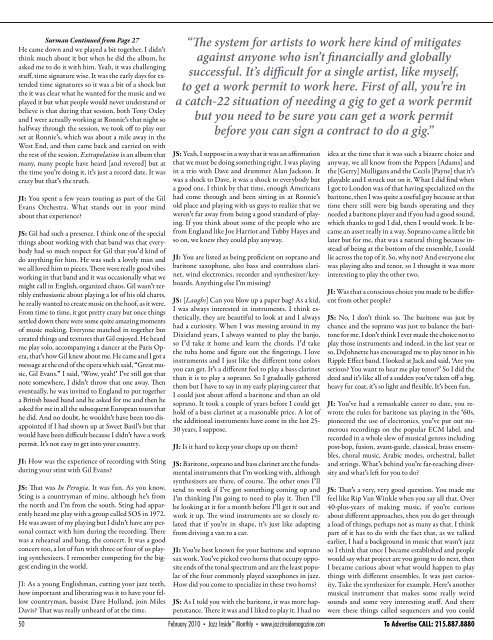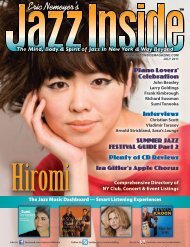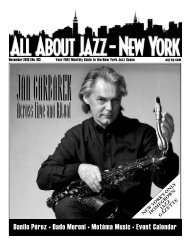February 2010 issue - Jazz Singers.com
February 2010 issue - Jazz Singers.com
February 2010 issue - Jazz Singers.com
You also want an ePaper? Increase the reach of your titles
YUMPU automatically turns print PDFs into web optimized ePapers that Google loves.
Surman Continued from Page 27 “The system for artists to work here kind of mitigates<br />
He came down and we played a bit together. I didn’t<br />
think much about it but when he did the album, he<br />
asked me to do it with him. Yeah, it was challenging<br />
stuff, time signature wise. It was the early days for extended<br />
time signatures so it was a bit of a shock but<br />
the it was clear what he wanted for the music and we<br />
played it but what people would never understand or<br />
believe is that during that session, both Tony Oxley<br />
and I were actually working at Ronnie’s that night so<br />
halfway through the session, we took off to play our<br />
set at Ronnie’s, which was about a mile away in the<br />
West End, and then came back and carried on with<br />
the rest of the session. Extrapolation is an album that<br />
many, many people have heard [and revered] but at<br />
the time you’re doing it, it’s just a record date. It was<br />
crazy but that’s the truth.<br />
JI: You spent a few years touring as part of the Gil<br />
Evans Orchestra. What stands out in your mind<br />
about that experience?<br />
JS: Gil had such a presence. I think one of the special<br />
things about working with that band was that everybody<br />
had so much respect for Gil that you’d kind of<br />
do anything for him. He was such a lovely man and<br />
we all loved him to pieces. There were really good vibes<br />
working in that band and it was occasionally what we<br />
might call in English, organized chaos. Gil wasn’t terribly<br />
enthusiastic about playing a lot of his old charts,<br />
he really wanted to create music on the hoof, as it were.<br />
From time to time, it got pretty crazy but once things<br />
settled down there were some quite amazing moments<br />
of music making. Everyone matched in together but<br />
created things and textures that Gil enjoyed. He heard<br />
me play solo, ac<strong>com</strong>panying a dancer at the Paris Opera,<br />
that’s how Gil knew about me. He came and I got a<br />
message at the end of the opera which said, “Great music,<br />
Gil Evans.” I said, ‘Wow, yeah!’ I’ve still got that<br />
note somewhere, I didn’t throw that one away. Then<br />
eventually, he was invited to England to put together<br />
a British based band and he asked for me and then he<br />
asked for me in all the subsequent European tours that<br />
he did. And no doubt, he wouldn’t have been too disappointed<br />
if I had shown up at Sweet Basil’s but that<br />
would have been difficult because I didn’t have a work<br />
permit. It’s not easy to get into your country.<br />
JI: How was the experience of recording with Sting<br />
during your stint with Gil Evans?<br />
JS: That was In Perugia. It was fun. As you know,<br />
Sting is a countryman of mine, although he’s from<br />
the north and I’m from the south. Sting had apparently<br />
heard me play with a group called SOS in 1972.<br />
He was aware of my playing but I didn’t have any personal<br />
contact with him during the recording. There<br />
was a rehearsal and bang, the concert. It was a good<br />
concert too, a lot of fun with three or four of us playing<br />
synthesizers. I remember <strong>com</strong>peting for the biggest<br />
ending in the world.<br />
JI: As a young Englishman, cutting your jazz teeth,<br />
how important and liberating was it to have your fellow<br />
countryman, bassist Dave Holland, join Miles<br />
Davis? That was really unheard of at the time.<br />
against anyone who isn’t financially and globally<br />
successful. It’s difficult for a single artist, like myself,<br />
to get a work permit to work here. First of all, you’re in<br />
a catch-22 situation of needing a gig to get a work permit<br />
but you need to be sure you can get a work permit<br />
before you can sign a contract to do a gig.”<br />
JS: Yeah, I suppose in a way that it was an affirmation<br />
that we must be doing something right. I was playing<br />
in a trio with Dave and drummer Alan Jackson. It<br />
was a shock to Dave, it was a shock to everybody but<br />
a good one. I think by that time, enough Americans<br />
had <strong>com</strong>e through and been sitting in at Ronnie’s<br />
old place and playing with us guys to realize that we<br />
weren’t far away from being a good standard of playing.<br />
If you think about some of the people who are<br />
from England like Joe Harriot and Tubby Hayes and<br />
so on, we knew they could play anyway.<br />
JI: You are listed as being proficient on soprano and<br />
baritone saxophone, alto bass and contrabass clarinet,<br />
wind electronics, recorder and synthesizer/keyboards.<br />
Anything else I’m missing?<br />
JS: [Laughs] Can you blow up a paper bag? As a kid,<br />
I was always interested in instruments. I think esthetically,<br />
they are beautiful to look at and I always<br />
had a curiosity. When I was messing around in my<br />
Dixieland years, I always wanted to play the banjo,<br />
so I’d take it home and learn the chords. I’d take<br />
the tuba home and figure out the fingerings. I love<br />
instruments and I just like the different tone colors<br />
you can get. It’s a different feel to play a bass clarinet<br />
than it is to play a soprano. So I gradually gathered<br />
them but I have to say in my early playing career that<br />
I could just about afford a baritone and than an old<br />
soprano. It took a couple of years before I could get<br />
hold of a bass clarinet at a reasonable price. A lot of<br />
the additional instruments have <strong>com</strong>e in the last 25-<br />
30 years, I suppose.<br />
JI: Is it hard to keep your chops up on them?<br />
JS: Baritone, soprano and bass clarinet are the fundamental<br />
instruments that I’m working with, although<br />
synthesizers are there, of course. The other ones I’ll<br />
tend to work if I’ve got something <strong>com</strong>ing up and<br />
I’m thinking I’m going to need to play it. Then I’ll<br />
be looking at it for a month before I’ll get it out and<br />
work it up. The wind instruments are so closely related<br />
that if you’re in shape, it’s just like adapting<br />
from driving a van to a car.<br />
JI: You’re best known for your baritone and soprano<br />
sax work. You’ve picked two horns that occupy opposite<br />
ends of the tonal spectrum and are the least popular<br />
of the four <strong>com</strong>monly played saxophones in jazz.<br />
How did you <strong>com</strong>e to specialize in these two horns?<br />
JS: As I told you with the baritone, it was more happenstance.<br />
There it was and I liked to play it. I had no<br />
idea at the time that it was such a bizarre choice and<br />
anyway, we all know from the Peppers [Adams] and<br />
the [Gerry] Mulligans and the Cecils [Payne] that it’s<br />
playable and I struck out on it. What I did find when<br />
I got to London was of that having specialized on the<br />
baritone, then I was quite a useful guy because at that<br />
time there still were big bands operating and they<br />
needed a baritone player and if you had a good sound,<br />
which thanks to god I did, then I would work. It became<br />
an asset really in a way. Soprano came a little bit<br />
later but for me, that was a natural thing because instead<br />
of being at the bottom of the ensemble, I could<br />
lie across the top of it. So, why not? And everyone else<br />
was playing alto and tenor, so I thought it was more<br />
interesting to play the other two.<br />
JI: Was that a conscious choice you made to be different<br />
from other people?<br />
JS: No, I don’t think so. The baritone was just by<br />
chance and the soprano was just to balance the baritone<br />
for me. I don’t think I ever made the choice not to<br />
play those instruments and indeed, in the last year or<br />
so, DeJohnette has encouraged me to play tenor in his<br />
Ripple Effect band. I looked at Jack and said, ‘Are you<br />
serious? You want to hear me play tenor?’ So I did the<br />
deed and it’s like all of a sudden you’ve taken off a big,<br />
heavy fur coat, it’s so light and flexible. It’s been fun.<br />
JI: You’ve had a remarkable career to date, you rewrote<br />
the rules for baritone sax playing in the ‘60s,<br />
pioneered the use of electronics, you’ve put out numerous<br />
recordings on the popular ECM label, and<br />
recorded in a whole slew of musical genres including<br />
post-bop, fusion, avant-garde, classical, brass ensembles,<br />
choral music, Arabic modes, orchestral, ballet<br />
and strings. What’s behind you’re far-reaching diversity<br />
and what’s left for you to do?<br />
JS: That’s a very, very good question. You made me<br />
feel like Rip Van Winkle when you say all that. Over<br />
40-plus-years of making music, if you’re curious<br />
about different approaches, then you do get through<br />
a load of things, perhaps not as many as that. I think<br />
part of it has to do with the fact that, as we talked<br />
earlier, I had a background in music that wasn’t jazz<br />
so I think that once I became established and people<br />
would say what project are you going to do next, then<br />
I became curious about what would happen to play<br />
things with different ensembles. It was just curiosity.<br />
Take the synthesizer for example. Here’s another<br />
musical instrument that makes some really weird<br />
sounds and some very interesting stuff. And there<br />
were these things called sequencers and you could<br />
50 <strong>February</strong> <strong>2010</strong> • <strong>Jazz</strong> Inside Monthly • www.jazzinsidemagazine.<strong>com</strong> To Advertise CALL: 215.887.8880




